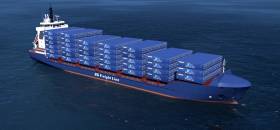Displaying items by tag: New 'Ireland' Containerships
New 'Ireland' Max Containerships for BG Freight Line
#NewContainerships - Container operator, BG Freight Line, a subsidiary of UK based Peel Ports Group, is to receive new tailor-made short-sea 'feeder' containerships optimised for the company’s Irish Sea Hub services.
The new class of ‘green’ vessels has been developed by BG Freight Line operation with ARKON Shipping as project initiator/commercial manager, technical managers Jüngerhans Maritime Services, and designers CIMC ORIC.
BG Freight Line will take delivery of four sister vessels under long-term charter after delivery from Zhoushan Changhong International Shipyard, with them expected to enter service during 2018.
The vessels will be built to DNV GL standards and will be fitted with state-of-the-art features in order to comply with Emission Control Area (ECA) requirements and BG Freight Line’s navigation and trading needs.
They will be fitted with a modern wet scrubber system for exhaust cleaning in order to fulfil the requirements for trading within the ECA area. The vessels are also fully fitted for the loading of 45ft short-sea containers in all positions, with room in total for 488 units.
Additionally, a various number of odd-sized containers can be stowed fast and securely due to a new proprietary and innovative cargo stowage system. To minimise operational cost the vessel will be fitted with a modern two-stroke main engine with very low fuel consumption.
All parameters of the vessels have been optimised for the trade between the North Continent, Ireland and the UK.
Koert Luitwieler, Shipping Director at BG Freight Line said: “As well as helping us, and our customers, to reduce their carbon emissions and costs, these custom vessels have a number of innovations to help keep us at the forefront of feeder services in the Irish Sea. We are looking forward to seeing them in service very soon.”
Ole Gabs, Director of ARKON Shipping said: “We are proud to have developed and managed this project under the current difficult shipping market conditions. We believe that the future for vessel design and construction is to have close partnerships between owners and charterers, especially where there is as ambition to meet the highest environmental standards.”
New 'Ireland' Max Ship Specifications
Container capacity: 1004 TEU, alternative 488 units 45ft
Deadweight: 13,250 tonnes on 8.0m draft
Length overall: 153m
Reefer plugs: 253
Service Speed: 16 knots
Exhaust cleaning by WET-scrubber






























































